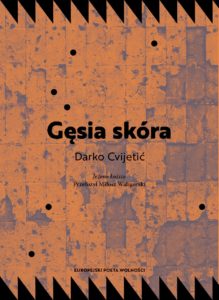Darko Cvijetić

Darko Cvijetić, Bosnia and Herzegovina. transl. by Miłosz Waligórski
Ježene kožice [Goosebumps]
Cvijetić writes about war in the former Yugoslavia and its accompanying atrocities in a dry, matter-of-fact tone, without emotions. He is like a war correspondent, capturing individual tragedies in poetic frames. This is not a story about feuding nations, exterminated villages or occupied cities. These are views of specific faces and singular deaths, motivated not by ideology, but by a sheer will to kill, with all its fiendish banality.
The publication of „Goosebumps” by Darko Cvijetić was co-funded by the Ministry of Culture and National Heritage from the Cultural Promotion Fund.
Wybór wierszy
Darko Cvijetić
 Darko Cvijetić (b. 1968 in Prijedor) is a poet, writer, director, actor and dramaturg from Bosnia and Herzegovina. He is a member of PEN Bosnia and Herzegovina and the Association of Writers of Bosnia and Herzegovina. Cvijetić works as a director and dramaturg at the Prijedor Theatre in Republika Srpska. He is the author of ten books of poetry: Noćni Gorbačov (1990, Nocturnal Gorbachev), Himenica (1996, Hymen Swallet), Manifest Mlade Bosne (2000, Young Bosnia Manifesto), Passport for Sforland (2004), Masovne razglednice iz Bosne (2012, Mass postcards from Bosnia), Konopci s otiskom vrata (2013, Ropes with neckprints), Mali ekshumatorski eseji (2015, Smalls essays on exhumation), Emotikoni u Viberu (2016, Emoticons on Viber), Paraolimpijske himne (2017, Paralympic hymns), Ježene kožice (2017, Goosebumps). His poems have been translated into French, English, German, Slovenian, Hebrew, Albanian, Hungarian, Polish, Macedonian and Yiddish. As an actor, he played, among others, in Crime and Punishment (dir. by Gradimir Gojer, 2007); A Tomb for Boris Davidovich (dir. by Gradimir Gojer, 2009); Waiting for Godot (dir. by Radenko Bilbija Clow, 2004); and Endgame (dir. by Dragoljub Mutić, 1990). He directed the following plays: Nije čovjek ko ne umre (A Man’s Got to Die) by Velimir Stojanović (1991), Srpska drama (A Serbian drama) by Siniša Kovačević (1995), Machiavelli’s The Mandrake (1997), Galeb, paviljon 6, po A.P. Čehovu (The Seagull, Ward. No. 6 after A. Chekhov; 2007), Ronald Harwood’s Taking Sides (2007) and Quartet (2012), Feničanke, materijali (Phoenicians, materials) – original project (2013); Generacija bez kosti (Boneless generation) – original project (2015) and Bunar (The well) by Radmila Smiljanić (2016).
Darko Cvijetić (b. 1968 in Prijedor) is a poet, writer, director, actor and dramaturg from Bosnia and Herzegovina. He is a member of PEN Bosnia and Herzegovina and the Association of Writers of Bosnia and Herzegovina. Cvijetić works as a director and dramaturg at the Prijedor Theatre in Republika Srpska. He is the author of ten books of poetry: Noćni Gorbačov (1990, Nocturnal Gorbachev), Himenica (1996, Hymen Swallet), Manifest Mlade Bosne (2000, Young Bosnia Manifesto), Passport for Sforland (2004), Masovne razglednice iz Bosne (2012, Mass postcards from Bosnia), Konopci s otiskom vrata (2013, Ropes with neckprints), Mali ekshumatorski eseji (2015, Smalls essays on exhumation), Emotikoni u Viberu (2016, Emoticons on Viber), Paraolimpijske himne (2017, Paralympic hymns), Ježene kožice (2017, Goosebumps). His poems have been translated into French, English, German, Slovenian, Hebrew, Albanian, Hungarian, Polish, Macedonian and Yiddish. As an actor, he played, among others, in Crime and Punishment (dir. by Gradimir Gojer, 2007); A Tomb for Boris Davidovich (dir. by Gradimir Gojer, 2009); Waiting for Godot (dir. by Radenko Bilbija Clow, 2004); and Endgame (dir. by Dragoljub Mutić, 1990). He directed the following plays: Nije čovjek ko ne umre (A Man’s Got to Die) by Velimir Stojanović (1991), Srpska drama (A Serbian drama) by Siniša Kovačević (1995), Machiavelli’s The Mandrake (1997), Galeb, paviljon 6, po A.P. Čehovu (The Seagull, Ward. No. 6 after A. Chekhov; 2007), Ronald Harwood’s Taking Sides (2007) and Quartet (2012), Feničanke, materijali (Phoenicians, materials) – original project (2013); Generacija bez kosti (Boneless generation) – original project (2015) and Bunar (The well) by Radmila Smiljanić (2016).
Miłosz Waligórski
 Miłosz Waligórski (b. 1981 in Bydgoszcz) is a graduate of Slavic and Hungarian studies. He lives and works in Novi Sad. Waligórski received the Adam Włodek Award (2015) and “Strzała Łuczniczki” Bydgoszcz Literary Award (2018). His translations from Hungarian, Slovakian and Serbo-Croatian as well as his own poetry and prose have been published in Afront, Akcent, Autoportret, Czas Kultury, Czas Literatury, Dwutygodnik, FA-art, Fabularia, Ha!art, Helikopter, Inter, Literatura na Świecie, Odra, Przegląd Polityczny, Rita Baum, Tekstualia, Tygodnik Powszechny, and Twórczość. His works have been translated into Slovenian, Rusyn and Serbian. He translated Poświęcenie hetmana by Lajos Grendel (2014), Doniesienia z krainy ciemności by Dževad Karahasan (2014), Entropia by Maroš Krajňak (2015), Drugi pocałunek Gity Danon by Miljenko Jergović (2016), Dzwony Einsteina by Lajos Grendel (2016), Jarmarczny kuglarz by Jelena Lengold (2016), Programy w labiryncie by István Kemény (2017), Życie w cztery tygodnie by Lajos Grendel (2018) and – together with Iza Zając – Víť Staviarsky’s prose Kiwader i inne opowieści (2011) and Daniela Kapitáňova’s novel Samka Tale księga o cmentarzu (2015). He is the author of translations of new Serbian poems published in the anthology Serce i krew (2015). He co-translated Opium by Géza Csáth (2016). Waligórski published four books of poetry: 36 sposobów na pustkę (2012), 32 ślady ku (2015), Długopis (2017) and Sztuka przekładu (2018) – and collections of short stories: Kto to widział (2016) and Małe prozy (2016, together with Anna Waligórska).
Miłosz Waligórski (b. 1981 in Bydgoszcz) is a graduate of Slavic and Hungarian studies. He lives and works in Novi Sad. Waligórski received the Adam Włodek Award (2015) and “Strzała Łuczniczki” Bydgoszcz Literary Award (2018). His translations from Hungarian, Slovakian and Serbo-Croatian as well as his own poetry and prose have been published in Afront, Akcent, Autoportret, Czas Kultury, Czas Literatury, Dwutygodnik, FA-art, Fabularia, Ha!art, Helikopter, Inter, Literatura na Świecie, Odra, Przegląd Polityczny, Rita Baum, Tekstualia, Tygodnik Powszechny, and Twórczość. His works have been translated into Slovenian, Rusyn and Serbian. He translated Poświęcenie hetmana by Lajos Grendel (2014), Doniesienia z krainy ciemności by Dževad Karahasan (2014), Entropia by Maroš Krajňak (2015), Drugi pocałunek Gity Danon by Miljenko Jergović (2016), Dzwony Einsteina by Lajos Grendel (2016), Jarmarczny kuglarz by Jelena Lengold (2016), Programy w labiryncie by István Kemény (2017), Życie w cztery tygodnie by Lajos Grendel (2018) and – together with Iza Zając – Víť Staviarsky’s prose Kiwader i inne opowieści (2011) and Daniela Kapitáňova’s novel Samka Tale księga o cmentarzu (2015). He is the author of translations of new Serbian poems published in the anthology Serce i krew (2015). He co-translated Opium by Géza Csáth (2016). Waligórski published four books of poetry: 36 sposobów na pustkę (2012), 32 ślady ku (2015), Długopis (2017) and Sztuka przekładu (2018) – and collections of short stories: Kto to widział (2016) and Małe prozy (2016, together with Anna Waligórska).

